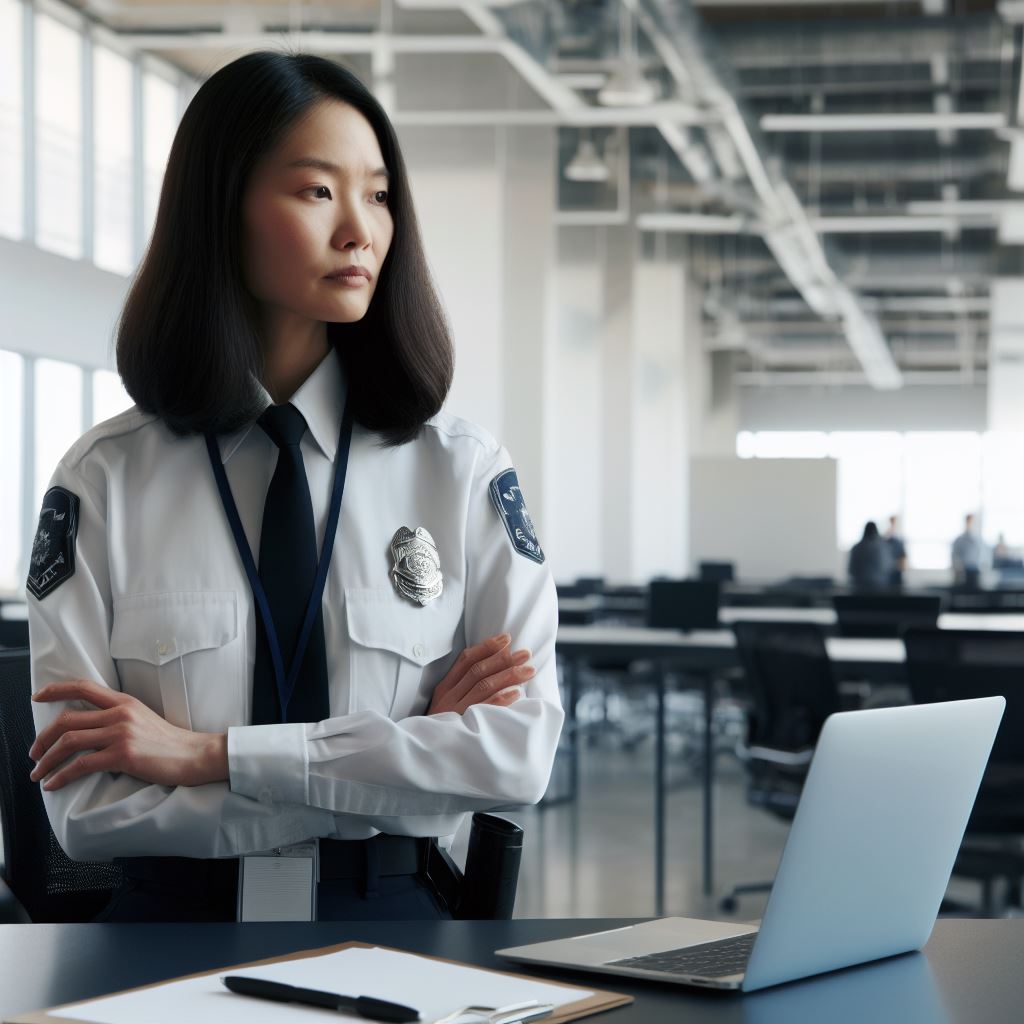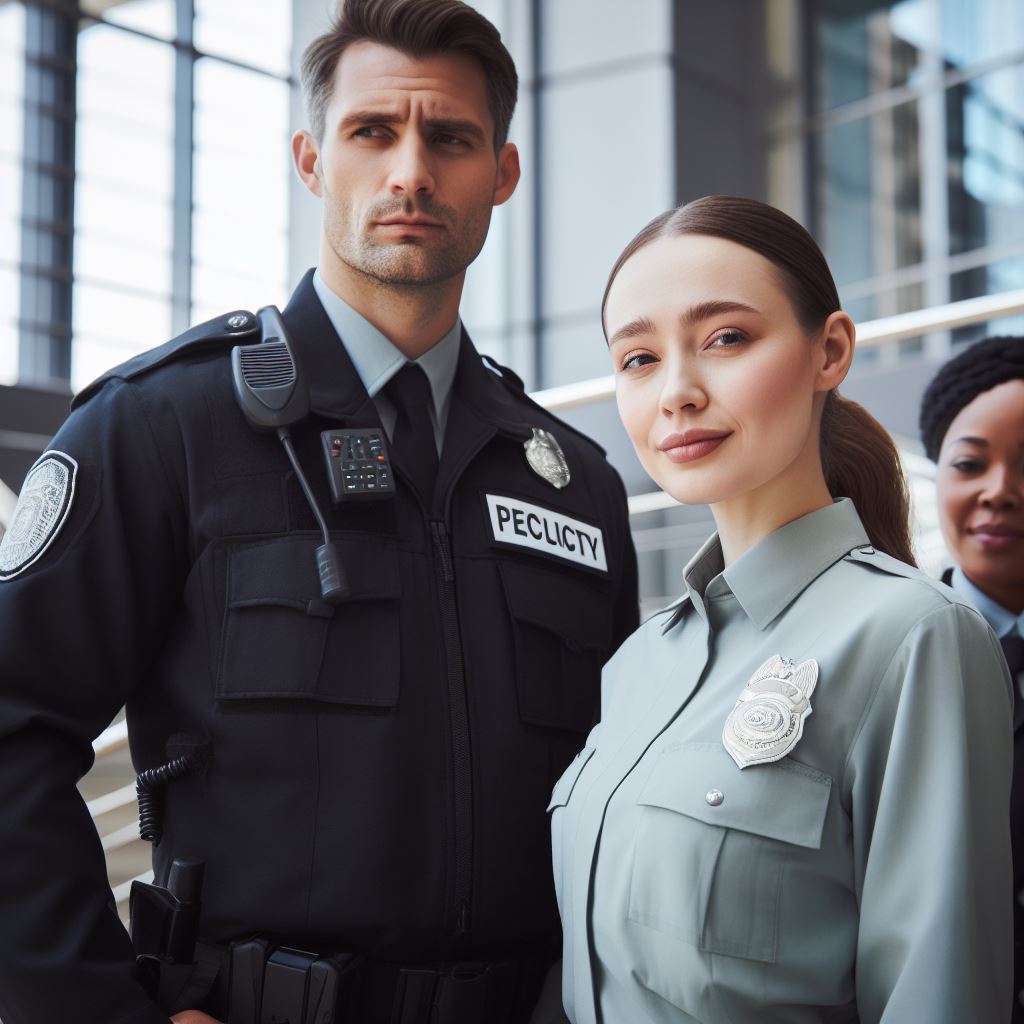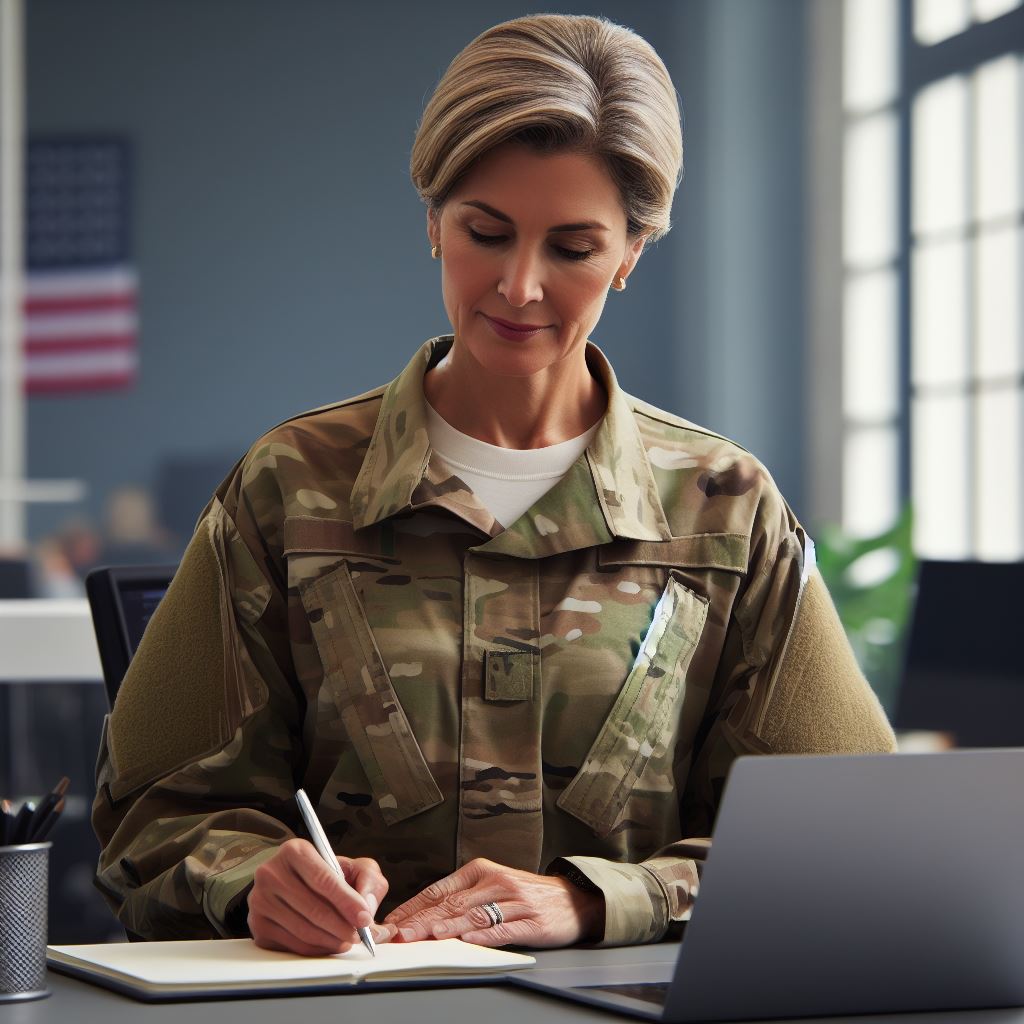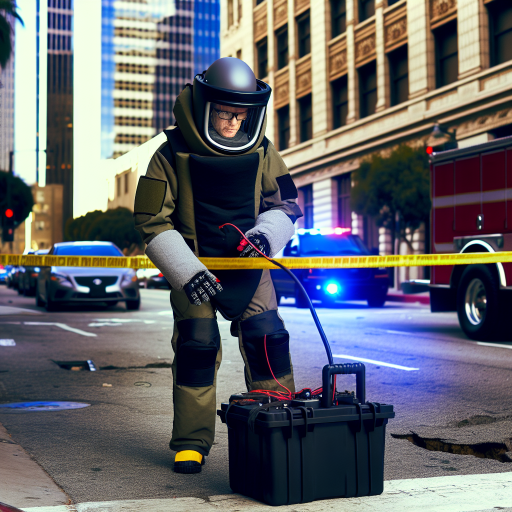Introduction
Importance of security guard etiquette when interacting with the public in the USA
Security guard etiquette is crucial when interacting with the public in the USA.
Security guards play a significant role in maintaining safety and order. However, they often face challenges and misconceptions.
The public’s perception of security guards is often influenced by Hollywood portrayals. Guards are often seen as aggressive or authoritarian.
Moreover, some people may view them as mere gatekeepers or obstacles.
However, security guards are essential for preventing theft, violence, and other criminal activities.
They are responsible for safeguarding both people and property. Their presence alone acts as a deterrent, creating a sense of security among the public.
Interacting with the public requires a specific set of skills and attitudes. Security guards must be approachable and friendly, ready to assist and answer questions.
They should practice active listening and effective communication to address concerns and diffuse potential conflicts.
Respecting individual rights and privacy is also crucial.
Guards must understand the importance of personal boundaries and avoid profiling or discriminating against individuals based on their appearance or background.
Being professional is paramount. Security guards should maintain a calm and composed demeanor, even in challenging situations.
They should follow established protocols and procedures and display a strong ethical code.
In addition, security guard etiquette is vital for ensuring positive interactions with the public in the USA.
By understanding their role, addressing misconceptions, and adhering to professional standards, security guards can contribute to a safer and more secure environment.
Understanding the Role
Role and responsibilities of security guards in the USA
Security guards play a vital role in maintaining safety and security in the USA.
- They are responsible for enforcing rules and regulations to prevent unauthorized access.
- Security guards also monitor surveillance systems to detect and prevent any potential threats.
- They conduct routine patrols to ensure the safety of the premises and its occupants.
- In emergency situations, security guards take immediate action to mitigate risks and protect people.
- They may also be responsible for identifying and reporting any suspicious activities or individuals.
Significance of Professionalism and Proper Etiquette
Professionalism and proper etiquette are essential for security guards to effectively interact with the public.
- Security guards represent the company or organization they work for, and their behavior reflects its image.
- Professionalism ensures that security guards maintain a high level of integrity and adhere to ethical standards.
- By displaying proper etiquette, security guards can create a positive and respectful environment for the public.
- It helps in building trust and establishing a sense of security among the individuals they interact with.
- Professionalism and proper etiquette also contribute to efficient communication and conflict resolution.
The Importance of Maintaining a Calm and Approachable Demeanor
Security guards must maintain a calm and approachable demeanor to effectively carry out their duties.
- A calm demeanor helps security guards handle stressful situations without panicking or escalating tensions.
- Approachability allows the public to feel comfortable approaching security guards with their concerns or questions.
- It encourages open communication and allows security guards to gather important information from the public.
- Maintaining a calm and approachable demeanor also helps in de-escalating potentially volatile situations.
- By remaining composed, security guards can diffuse conflicts and ensure the safety of everyone involved.
In review, security guards have a vital role in ensuring safety and security in the USA.
Professionalism, proper etiquette, a calm demeanor, and approachability are all essential qualities for security guards to effectively interact with the public.
By understanding their role and responsibilities, security guards can fulfill their duties with efficiency and contribute to a safe environment for everyone.
Effective Communication Skills
Significance of Active Listening and Empathy in Dealing with the Public
- Active listening involves fully concentrating, understanding, and responding to the person speaking.
- Security guards who actively listen to the public can detect potential issues, concerns, or threats more effectively.
- By demonstrating empathy, security guards can create a positive and supportive environment for those they interact with.
- Empathy helps security guards understand and anticipate the needs of the public, enhancing customer service.
- Active listening and empathy contribute to conflict resolution and de-escalation, promoting a safe and secure environment.
Significance of Effective Communication Skills for Security Guards
Effective communication skills are paramount for security guards in their daily interactions with the public.
Clear and concise language, coupled with active listening and empathy, play a significant role in establishing trust, preventing incidents, and fostering a safe environment.
Security guards rely on effective communication to carry out their duties efficiently. By articulating instructions and information clearly, they enhance safety and prevent potential security risks.
Additionally, good communication skills enable security guards to de-escalate conflicts and confrontations professionally, maintaining a positive image for the profession as a whole.
Importance of Using Clear and Concise Language
- Using clear and concise language ensures that important information is accurately conveyed.
- Ambiguity or confusion resulting from unclear communication can lead to misunderstandings and potential security risks.
- Security guards must articulate their thoughts succinctly to ensure that instructions are easily understood and followed.
- By avoiding jargon or technical terms, security guards can communicate effectively with individuals from diverse backgrounds.
- Using clear language also projects professionalism and instills confidence in the public.
Using clear and concise language is crucial for security guards. Unclear communication can lead to misunderstandings, jeopardizing public safety.
Security professionals must express their thoughts succinctly, avoiding jargon or technical terms that may confuse individuals from diverse backgrounds.
This clarity not only ensures accurate transmission of information but also demonstrates professionalism.
Significance of Active Listening and Empathy in Dealing with the Public
- Clear and effective communication skills are essential for security guards to carry out their duties effectively.
- Good communication helps security guards establish trust and rapport with the public they interact with.
- By effectively communicating instructions and information, security guards can enhance safety and prevent incidents.
- Strong communication skills enable security guards to de-escalate conflicts or confrontations in a professional manner.
- Interacting with the public confidently and courteously improves the overall perception of the security guard profession.
Active listening is a vital aspect of effective communication for security guards.
By fully engaging in the conversation and understanding the speaker’s concerns, security guards can identify potential issues or threats more effectively.
Active listening shows respect and helps build trust with the public, enhancing the overall security experience.
Furthermore, empathy is essential for security guards to provide excellent customer service. By empathizing with individuals, security guards create a supportive environment that addresses their unique needs.
Understanding the perspective of the public allows security guards to anticipate their requirements and proactively address them.
The combination of active listening and empathy contributes to conflict resolution and de-escalation.
Security guards who actively listen and demonstrate empathy can diffuse tense situations, promoting a safe and secure environment for both the public and themselves.
These skills are particularly valuable in situations where emotions may be heightened or tensions may arise.
In review, effective communication skills are fundamental for security guards when interacting with the public.
Clear and concise language, active listening, and empathy all contribute to creating a safe and positive environment.
By honing these skills, security guards can excel in their profession and ensure the well-being of the public they serve.
Read: Rituals and Traditions in U.S. Firefighting Culture
Respecting Boundaries and Personal Space
In this section, we will discuss the importance of respecting personal space and boundaries, and how security guards can maintain safety without violating personal space.
Transform Your Career Today
Unlock a personalized career strategy that drives real results. Get tailored advice and a roadmap designed just for you.
Start Now- Respecting personal space is crucial as it promotes a sense of comfort and security for individuals.
- Security guards play a pivotal role in ensuring the safety of people, property, and establishments.
- However, it is important for security guards to balance their role while being sensitive to personal boundaries.
Role of Security Guards in Ensuring Safety
- Security guards are responsible for maintaining order, preventing crimes, and protecting individuals.
- They serve as a visible deterrent, reassuring people of their safety.
- While performing their duties, security guards should be aware of personal space and respect it.
- Approaching individuals should only be necessary when there is a potential threat or suspicious activity.
Maintaining Respectful Approaches
- When approaching individuals, security guards should greet them politely, identifying themselves and their purpose.
- It is important to maintain an appropriate distance to respect personal space.
- Using calm and non-threatening language can help diffuse tense situations without intruding personal boundaries.
- If there is a need to conduct a search or inspection, security guards should explain the process politely, ensuring the individual feels respected.
- In cases where it is necessary to physically intervene, security guards should do so with the utmost care while minimizing contact.
Instances where security guards may need to approach individuals respectfully
- When requesting identification documents, security guards should clearly communicate why it is necessary and assure confidentiality.
- During emergencies or evacuations, security guards may need to guide individuals, following established protocols, and respecting personal space.
- When addressing disruptive behavior, security guards should aim to maintain a calm and professional demeanor, while dealing with the situation appropriately.
- At entrances or exits, security guards may need to approach individuals for bag checks or verification, always explaining the purpose courteously.
In generally, security guards play a vital role in maintaining safety without violating personal space. Respecting boundaries and personal space is essential for ensuring the comfort and trust of individuals.
By approaching people respectfully, adhering to guidelines, and communicating effectively, security guards can fulfill their duties diligently and maintain a harmonious environment for all.
Read: Balancing Personal Life & Policing: Officer Stories

Conflict Resolution
Conflicts are an inevitable part of a security guard’s job. Whether it’s dealing with unruly individuals or diffusing tension between parties, conflict resolution skills are essential for maintaining a safe and secure environment.
In this section, we will discuss the challenges security guards may face when dealing with conflicts.
Highlight the importance of de-escalating tense situations through effective communication and conflict resolution skills, and provide tips on remaining calm and composed during challenging interactions.
Challenges Faced by Security Guards
Security guards often find themselves in situations where conflict arises.
These conflicts can range from heated arguments between individuals to large-scale disturbances. The challenges faced by security guards include:
- Lack of Cooperation: In some instances, conflicting parties may refuse to cooperate or follow instructions, making it difficult for security guards to address the issue peacefully.|
- Emotional and Aggressive Individuals: Dealing with emotionally charged or physically aggressive individuals requires a high level of skill and patience. Security guards must be prepared to handle such situations without exacerbating the conflict.
- Limited Authority: Security guards have limited authority when it comes to enforcing the law. Balancing the need to maintain order while respecting legal boundaries can be challenging.
The Importance of De-escalation
De-escalating tense situations through effective communication and conflict resolution skills is crucial.
Successful de-escalation not only prevents potential physical harm but also helps maintain a positive image for the security guard profession. Here’s why de-escalation is vital:
- Safety: De-escalating conflicts minimizes the risk of violence and injury to all parties involved, including the security guard.
- Professionalism: Remaining calm and composed demonstrates professionalism and enhances the reputation of security guards as capable and trustworthy individuals.
- Conflict Resolution: Resolving conflicts peacefully promotes a harmonious environment and reduces the likelihood of future incidents.
Tips for Remaining Calm and Composed
Even the most experienced security guards can find themselves in challenging interactions. Here are some tips for staying calm and composed during conflicts:
- Active Listening: Pay attention to the concerns of all parties involved and show empathy by acknowledging their feelings.
- Stay Neutral: Avoid taking sides. Maintain a neutral stance to avoid escalating the situation further.
- Use Verbal and Nonverbal Communication: Choose your words and tone carefully to calm the parties involved. Additionally, use open body language to show approachability and defuse tension.
- Maintain Control: Stay in control of your emotions and reactions. Take deep breaths, remain focused, and think before responding.
- Seek Assistance: If the situation escalates or becomes unmanageable, call for backup or involve law enforcement, depending on the severity of the conflict.
Remember, security guards play a crucial role in maintaining order, safety, and peace.
By effectively managing conflicts and practicing de-escalation techniques, security guards contribute to a positive and secure environment.
Read: The Relationship Between U.S. Firefighters and EMTs
See Related Content: Military Strategy: The Art and Science of Modern Warfare
Cultural Sensitivity
Emphasize the importance of cultural sensitivity when interacting with a diverse public
- Emphasize the importance of cultural sensitivity when interacting with a diverse public.
- Respect different cultural norms and practices to ensure positive interactions.
- Be mindful of cultural considerations to promote a safe and inclusive environment.
In a country as diverse as the United States, security guards play a crucial role in ensuring the safety and well-being of the public.
However, it is important for security guards to understand that cultural sensitivity is a key aspect of their job.
By recognizing and respecting different cultural norms and practices, security guards can effectively interact with the public and create a positive and inclusive atmosphere.
Need to respect different cultural norms and practices
Cultural sensitivity is vital because it acknowledges and respects the unique values and beliefs held by individuals from different cultural backgrounds.
When security guards display cultural sensitivity, they demonstrate a willingness to understand and appreciate diversity. This, in turn, helps build trust and establish positive relationships with the public.
A security guard should always be mindful of cultural considerations to avoid any unintentional offense or conflict.
One essential aspect of cultural sensitivity is being aware of personal space boundaries. In some cultures, individuals prefer a larger personal space, while others may be comfortable with closer physical proximity.
By being mindful of these differences, security guards can avoid making individuals feel uncomfortable or disrespected.
Examples of cultural considerations that security guards should be mindful of
Another cultural consideration is communication style. Some cultures may prioritize speaking softly and using non-verbal cues, while others may have a more direct and assertive style.
It’s crucial for security guards to adapt their communication approach based on the cultural background of the individuals they interact with, ensuring effective and respectful communication.
Additionally, security guards should be mindful of cultural practices when providing directions or instructions.
For example, pointing with a finger may be considered rude or disrespectful in some cultures. Instead, security guards should use an open hand or verbal directions to accommodate different cultural norms.
Regarding attire, security guards should be aware of any cultural or religious requirements that individuals may have.
For instance, certain religions have specific dress codes or modesty considerations. Respecting these practices and allowing individuals to adhere to their beliefs fosters a sense of inclusion and respect.
Cultural sensitivity also extends to the handling of personal belongings or religious items.
Security guards should be cautious and respectful when searching or handling personal belongings, ensuring no cultural or religious objects are mishandled or disrespected.
Proper training and understanding of cultural practices can help avoid any unnecessary conflicts or misunderstandings.
In essence, security guards in the United States must prioritize cultural sensitivity when interacting with the public.
By respecting different cultural norms and considering cultural considerations, security guards create a safe and inclusive environment.
This approach fosters positive relationships, enhances trust, and ensures that everyone feels respected and valued.
Read: Surviving High-Risk Scenarios: Tips from U.S. Fire Vets
Showcase Your Business Today
Reach thousands of readers actively exploring professional services. Publish your business profile and grow your audience now.
Publish NowProper Protocol and Procedures
- Following proper protocol and procedures is essential for security guards in their interactions with the public in the USA.
- It ensures that security guards are equipped with the necessary knowledge to handle various situations effectively.
- By familiarizing security guards with specific guidelines and regulations, they can adhere to legal and ethical standards.
- Security guards need to understand the importance of carrying out their duties responsibly and professionally.
- Proper protocol and procedures help maintain the safety and security of the premises and individuals.
Importance of Familiarizing Security Guards
- Each workplace has its own unique set of rules and regulations that security guards must be familiar with.
- Being aware of these guidelines allows security guards to protect the property and people in their care more effectively.
- Knowing the layout of the area they are responsible for enables security guards to respond quickly during emergencies.
- Familiarization with workplace guidelines ensures that security guards understand their roles and responsibilities clearly.
- Adhering to specific protocols supports a consistent approach to security across the organization.
The Role of Ongoing Training
- Ongoing training is crucial in keeping security guards up to date with the latest protocols and procedures.
- It helps security guards stay informed about any changes or updates in guidelines and regulations.
- Regular training sessions provide opportunities for security guards to practice and refine their skills.
- Training reinforces the importance of following protocols to avoid unnecessary risks or legal complications.
- Continual education creates a more professional and knowledgeable workforce, enhancing overall security operations.
Following proper protocol and procedures is vital for security guards when interacting with the public in the USA.
Familiarizing security guards with workplace guidelines and regulations ensures their efficiency and effectiveness in maintaining safety and security.
Ongoing training plays a crucial role in updating security guards with the latest protocols, enhancing their skills, and keeping them well-prepared for any eventualities.
These practices contribute to a more secure environment and instill confidence in both the public and the security guards themselves.
Conclusion
In the end, it is essential for security guards to understand and practice proper etiquette when interacting with the public in the USA.
By recapitulating the main points discussed in this blog post, we have highlighted the significance of maintaining professionalism and effective communication skills.
Security guard etiquette plays a crucial role in establishing trust, promoting safety, and ensuring a positive public perception of the security industry.
By consistently improving their communication skills, security guards can effectively diffuse conflicts, handle sensitive situations, and address public concerns.
As representatives of security agencies, it is important for security guards to be respectful, approachable, and empathetic when dealing with the public.
Building rapport with the community not only enhances security measures but also fosters a sense of trust and collaboration between security personnel and the people they safeguard.
To maintain professionalism and enhance their effectiveness, security guards should undergo training programs that emphasize communication techniques, conflict resolution, and cultural sensitivity.
Continuous improvement is essential as it enables security guards to adapt to evolving situations and varying community needs.
In closing, security guard etiquette is not only crucial for maintaining order and security but also for enhancing public relations.
By upholding strong communication skills and professionalism, security guards can effectively serve their role as protectors of the public, ensuring a safe and secure environment for all.
[E-Books for Sale]
The Big Book of 500 High-Paying Jobs in America: Unlock Your Earning Potential
$19.99 • 500 High-Paying Jobs • 330 pages
Explore 500 high-paying jobs in America and learn how to boost your career, earn more, and achieve success!
See All 500 High-Paying Jobs of this E-Book
1001 Professions Without a Degree: High-Paying American Jobs You Can Start Now
$19.99 • 1001 Professions Without a Degree • 174 pages
Discover 1001 high-paying jobs without a degree! Unlock career tips, skills, and success strategies for just $19.99!




